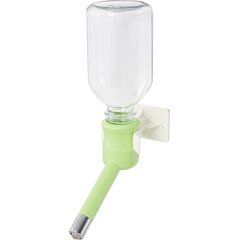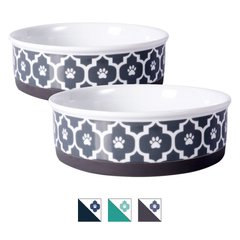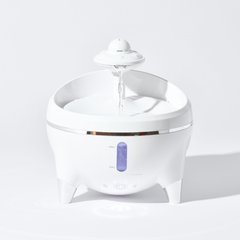Is Tap Water Safe for Dogs? Risks, Benefits, and Making the Best Choice for Your Dog
Petra Richli/iStock / Getty Images Plus via Getty Images
As a responsible and loving pet parent, you strive to give the best possible care to your four-legged best friend.
A key aspect of that care is making sure your pet always has access to clean, safe drinking water.
So, you may be wondering, “Is tap water safe for dogs to drink?”
Let’s explore the potential risks and benefits of tap water for dogs to help you make an informed decision about hydrating your fur baby.
What Is Tap Water?
Tap water is water that comes directly from a faucet—in homes, businesses, and public places.
It’s supplied through a network of pipes and is the most common source of water for everyday activities, such as drinking, cooking, bathing, and cleaning.
Tap water is typically sourced from surface water, such as rivers, lakes, and reservoirs, or groundwater (i.e., aquifers accessed through wells), depending on your geographic location and local water management practices.
Tap water is usually safe to drink in areas that have strict regulatory standards and effective treatment systems.
Most urban and suburban tap water is treated and regulated to meet safety standards set by government agencies, such as the United States Environmental Protection Agency (EPA).
This treatment typically involves removing contaminants and adding disinfectants to kill harmful pathogens, but the tap water’s composition can vary significantly depending on the source and local infrastructure.
Common tap water elements include:
-
Chlorine/chloramine: These disinfectants are added to kill harmful microorganisms.
-
Fluoride: Fluoride is added in some areas to help reduce dental cavities in humans.
-
Minerals: Essential minerals, such as calcium and magnesium, may naturally occur or be added to improve taste and provide health benefits.
Tap water is usually safe to drink in areas that have strict regulatory standards and effective treatment systems.
However, to stay ahead of potential contaminants, it’s wise to stay informed about your local water quality and take proactive steps to ensure your water remains clean and safe.
Is Tap Water Safe for Dogs?
Many pet parents around the world commonly give their dogs tap water due to its convenience and accessibility.
However, whether tap water is truly safe for your dog can depend on several factors, including your local water quality and your individual dog’s health.
Veterinarians generally deem tap water a safe choice for hydrating dogs and puppies if it meets safety standards.
To ensure the water you provide is safe, you can regularly review local water quality reports, which are typically available from municipal water suppliers.
These reports detail contaminant levels and confirm if the water meets established safety criteria.
Potential Risks of Tap Water for Dogs
While tap water is generally safe for dogs and puppies, there are a few potential concerns to keep in mind:
-
Chlorine and chloramine: These disinfectants are commonly used in water treatment and are typically safe in small amounts. However, they can sometimes cause mild gut irritation in some dogs and puppies.
-
Heavy metals: Older plumbing systems might leach heavy metals like lead and copper into the water. Prolonged exposure to these metals can harm dogs, potentially leading to health issues such as kidney damage or neurologic problems.
-
Pesticides and chemicals: Industrial pollution and water from fertilized and treated farm fields that flows into lakes, rivers, and groundwater can introduce trace amounts of harmful chemicals into the water supply. Over time, these chemicals might pose health risks, such as toxicity.
-
Microorganisms: Although water treatment processes aim to eliminate harmful bacteria, viruses, and protozoa (i.e. single celled infectious organisms), there’s still a small risk that these pathogens might be present in tap water.
-
Fluoride: Added to many water supplies to promote human dental health, excessive amounts can be toxic to dogs and puppies, possibly leading to dental and skeletal problems.
Though uncommon, some dogs may be sensitive or allergic to certain contaminants or additives in tap water.
Signs of sensitivity might include:
-
Respiratory problems, such as wheezing and difficulty breathing, due to airborne chemicals in the water, in rare cases
Bottled Water for Dogs
Bottled water is generally considered safe for dogs and can be a reliable hydration source, especially if the quality of tap water is a concern.
However, there are some factors to consider before offering your dog bottled water.
Chemicals such as bisphenol A (BPA) from plastic bottles can leach into the water, especially if the bottles are exposed to heat.
These chemicals can potentially harm dogs over time. Opting for BPA-free bottles or glass bottles can mitigate this risk.
Some bottled waters, particularly mineral waters like Dasani® and Aquafina®, have a higher sodium (salt) content than other brands.
While sodium is an essential electrolyte for dogs, the amount and frequency of its consumption can be a concern. The recommended daily sodium intake for dogs is generally around 0.5% of their total diet.
Considerations include:
-
Water consumption: If a healthy dog drinks a typical amount of bottled mineral water (i.e., one to two liters per day for a medium-sized dog), the additional sodium intake would be minimal and unlikely to pose a significant risk.
-
Dog’s health: Dogs with specific health conditions, such as heart disease, kidney disease, and hypertension, may need their sodium intake more closely monitored. In such cases, even small increases in sodium could be problematic.
-
Overall diet: If a dog’s regular diet is balanced and not high in sodium, occasionally consuming bottled mineral water should not be harmful. But if the diet is already sodium-rich, the extra sodium in the water may contribute to excessive intake.
Filtered Water for Dogs
Providing your dog with filtered water can be a good option to ensure they are drinking clean, safe water free from potential contaminants.
Filtered water benefits for dogs include:
-
Contaminants are removed: Filtering water can remove many common contaminants found in tap water, such as chlorine, heavy metals, and pesticides.
-
Taste and smell are improved: Some dogs may be sensitive to the taste and smell of tap water, especially if chlorine levels are high. Filtered water often tastes and smells better, which can encourage your dog to drink more.
-
Help for sensitive dogs: If your dog is sensitive to substances in tap water, filtered water can help reduce reactions such as an upset stomach.
While filtered water provides a good hydration option for your dog, regular filter maintenance is essential.
A poorly maintained filter can become a breeding ground for bacteria and may not remove contaminants effectively.
What Veterinarians Recommend
Most veterinarians say tap water is safe for hydrating your dog, and filtered water is also beneficial, especially if your dog has sensitivities.
The most important thing is ensuring your dog always has access to fresh, clean water.
Some bottled waters, particularly mineral waters like Dasani® and Aquafina®, have a higher sodium (salt) content than other brands.
Provide several water bowls throughout your home, and clean and refresh them daily. Using a pet water fountain may encourage your dog to drink more water.
On outings, take dog-safe bottled water and a portable water bowl, and offer your dog a drink regularly.
Is Tap Water Safe for Dogs FAQs
Is fluoride in tap water safe for dogs?
While the fluoride in tap water is typically safe for dogs, excessive intake can lead to fluorosis, which can cause dental problems and other health issues.
The risk of overexposure depends on the dog’s size, age, overall health, and the amount of fluoride consumed. Signs of fluoride toxicity include excessive drooling, vomiting, and diarrhea.
Is purified water good for dogs?
Purified water can be a good hydration option for your dog, especially if they are sensitive to tap water additives or if a health condition requires strict control over water purity.
What are some dog tap water allergy symptoms?
If your dog has a tap water allergy, signs may include gastrointestinal issues such as vomiting or diarrhea, skin problems, or in severe cases, respiratory problems.



